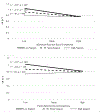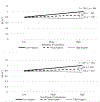Low School Support Exacerbates the Association between Peer Difficulties and Sluggish Cognitive Tempo in Adolescents
- PMID: 34081553
- PMCID: PMC8639839
- DOI: 10.1080/15374416.2021.1923021
Low School Support Exacerbates the Association between Peer Difficulties and Sluggish Cognitive Tempo in Adolescents
Abstract
Objective: Although peer difficulties and sluggish cognitive tempo (SCT) are related, studies have yet to examine environmental factors that may advance further understanding of this association. The current study tested whether peer difficulties, specifically social competence and peer victimization, interacted with school support, a component of school climate, in relation to adolescents' SCT symptoms. Further, we explored whether these relations would be differentially associated with SCT in adolescents with and without attention-deficit/hyperactivity disorder (ADHD).
Method: Adolescents (N = 288; Mage = 14.08, 45% female, 82.6% White; 52% with ADHD) completed measures of social competence, peer victimization, school climate support, and SCT and ADHD inattentive (IN) symptoms. Parents also reported on adolescents' social competence, SCT, and ADHD-IN symptoms.
Results: Results indicated that adolescent and parent ratings of lower social competence were both associated with higher adolescent-reported SCT symptoms in the context of low, but not high, school support. Relational and nonphysical victimization were associated with higher self-reported SCT symptoms in the context of low school support. Lower adolescent- and parent-reported social competence were also related to higher parent-reported SCT symptoms, with these associations not moderated by school support. These results remained after controlling for demographics and ADHD-IN symptoms and were similar across adolescents with and without ADHD.
Conclusions: Findings from the current study are the first to provide evidence that peer difficulties and school climate are jointly related to adolescents' self-reported SCT and underscore the importance of continued research investigating social adversity and environmental factors in relation to SCT.
Figures


Similar articles
-
Longitudinal Association of Sluggish Cognitive Tempo with Depression in Adolescents and the Possible Role of Peer Victimization.Res Child Adolesc Psychopathol. 2022 Jun;50(6):809-822. doi: 10.1007/s10802-022-00923-3. Epub 2022 Apr 14. Res Child Adolesc Psychopathol. 2022. PMID: 35420391
-
Sluggish Cognitive Tempo among Iranian Children and Adolescents: A Validation Study of the Farsi Child and Adolescent Behavior Inventory (CABI)-Parent Version.J Clin Med. 2022 Oct 27;11(21):6346. doi: 10.3390/jcm11216346. J Clin Med. 2022. PMID: 36362574 Free PMC article.
-
Sluggish cognitive tempo and attention-deficit/hyperactivity disorder (ADHD) inattention in the home and school contexts: Parent and teacher invariance and cross-setting validity.Psychol Assess. 2017 Feb;29(2):209-220. doi: 10.1037/pas0000325. Epub 2016 May 5. Psychol Assess. 2017. PMID: 27148788 Free PMC article.
-
Sluggish Cognitive Tempo in Adolescents with and without ADHD: Differentiation from Adolescent-Reported ADHD Inattention and Unique Associations with Internalizing Domains.J Abnorm Child Psychol. 2020 Mar;48(3):391-406. doi: 10.1007/s10802-019-00603-9. J Abnorm Child Psychol. 2020. PMID: 31814060 Free PMC article.
-
Social Functioning in Youth with Attention-Deficit/Hyperactivity Disorder and Sluggish Cognitive Tempo.Yale J Biol Med. 2019 Mar 25;92(1):29-35. eCollection 2019 Mar. Yale J Biol Med. 2019. PMID: 30923471 Free PMC article. Review.
Cited by
-
Report of a Work Group on Sluggish Cognitive Tempo: Key Research Directions and a Consensus Change in Terminology to Cognitive Disengagement Syndrome.J Am Acad Child Adolesc Psychiatry. 2023 Jun;62(6):629-645. doi: 10.1016/j.jaac.2022.07.821. Epub 2022 Aug 22. J Am Acad Child Adolesc Psychiatry. 2023. PMID: 36007816 Free PMC article.
-
ADHD and cognitive disengagement syndrome symptoms related to self-injurious thoughts and behaviors in early adolescents.Eur Child Adolesc Psychiatry. 2025 Mar;34(3):1195-1206. doi: 10.1007/s00787-024-02556-x. Epub 2024 Sep 5. Eur Child Adolesc Psychiatry. 2025. PMID: 39235462 Free PMC article.
-
What dimensions of school climate promote adaptive functioning in adolescents with ADHD? A prospective longitudinal study.Res Dev Disabil. 2025 Feb;157:104903. doi: 10.1016/j.ridd.2024.104903. Epub 2025 Jan 8. Res Dev Disabil. 2025. PMID: 39787777
-
Analysis of school support: Systematic literature review of core Chinese- and English-language journals published in 2000-2021.Front Psychol. 2022 Aug 8;13:933695. doi: 10.3389/fpsyg.2022.933695. eCollection 2022. Front Psychol. 2022. PMID: 36003103 Free PMC article.
-
Influential factors of depression: The impact of harsh parenting, school support, and rumination.Heliyon. 2024 Jan 26;10(3):e25014. doi: 10.1016/j.heliyon.2024.e25014. eCollection 2024 Feb 15. Heliyon. 2024. PMID: 38322886 Free PMC article.
References
-
- Becker SP (2014). Sluggish cognitive tempo and peer functioning in school-aged children: A six-month longitudinal study. Psychiatry Research, 217(1–2), 72–78. - PubMed
-
- Becker SP, Burns GL, Smith ZR, & Langberg JM (2020). Sluggish cognitive tempo in adolescents with and without ADHD: Differentiation from adolescent-reported ADHD inattention and unique associations with internalizing domains. Journal of Abnormal Child Psychology, 48, 391–406. doi: 10.1007/s10802-019-00603-9 - DOI - PMC - PubMed
Publication types
MeSH terms
Grants and funding
LinkOut - more resources
Full Text Sources
Medical
